Analyzing Leadership Styles & Networks Impact on John Lewis Employees
VerifiedAdded on 2022/11/29
|8
|1666
|235
Report
AI Summary
This report examines the impact of leadership styles and inter-organizational networks on the performance of individuals working within John Lewis. It aims to provide a basic understanding of these concepts, determine ways to improve employee performance, and identify their influence within the organization. The research employs a qualitative approach, using questionnaires and interviews with 30 employees to gather data. Ethical considerations, including informed consent and confidentiality, were prioritized throughout the research process. The researcher reflects on the challenges and insights gained during the study, emphasizing the importance of ethical practices and respecting participant privacy. The report concludes with an ethics checklist to ensure adherence to ethical guidelines.
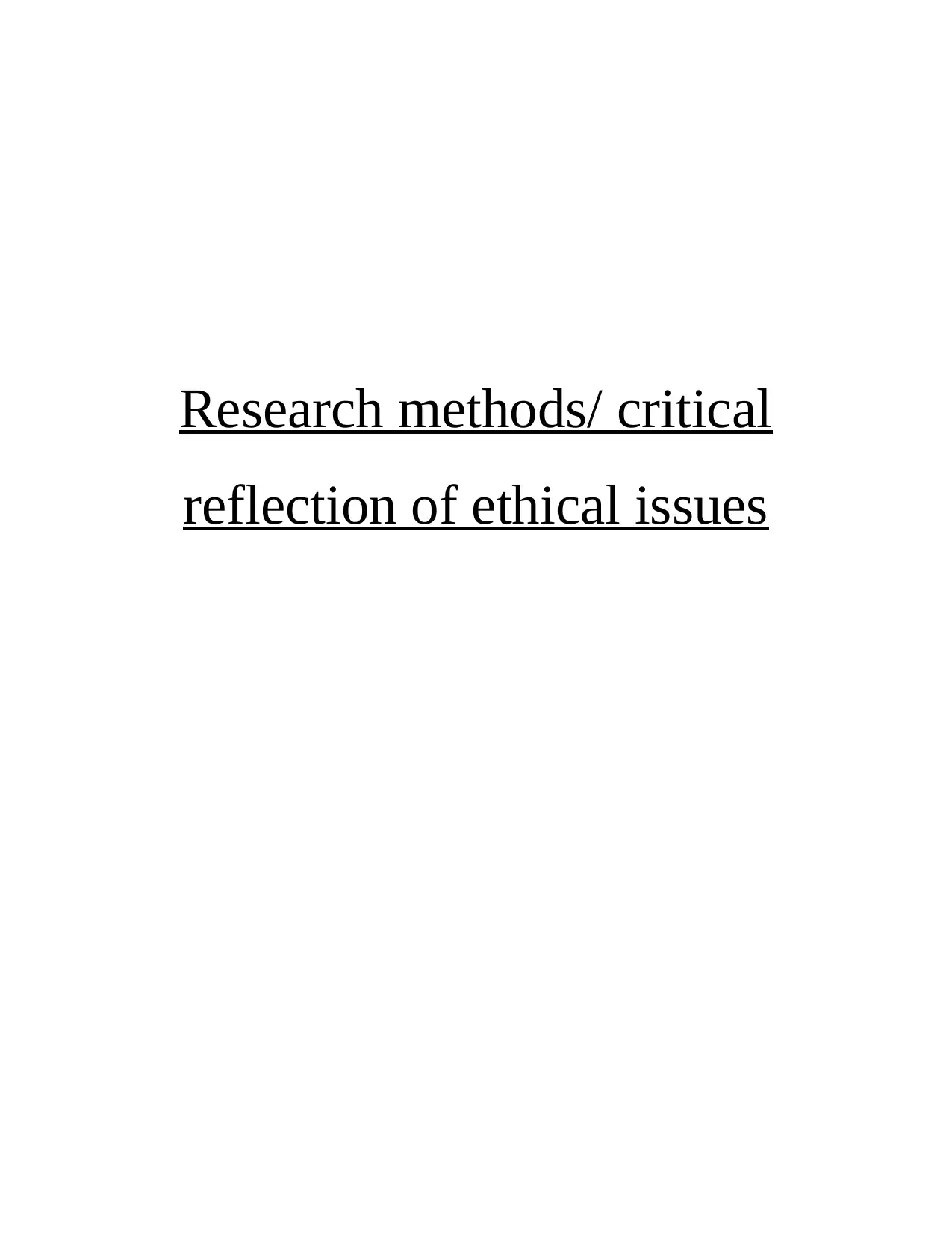
Research methods/ critical
reflection of ethical issues
reflection of ethical issues
Paraphrase This Document
Need a fresh take? Get an instant paraphrase of this document with our AI Paraphraser
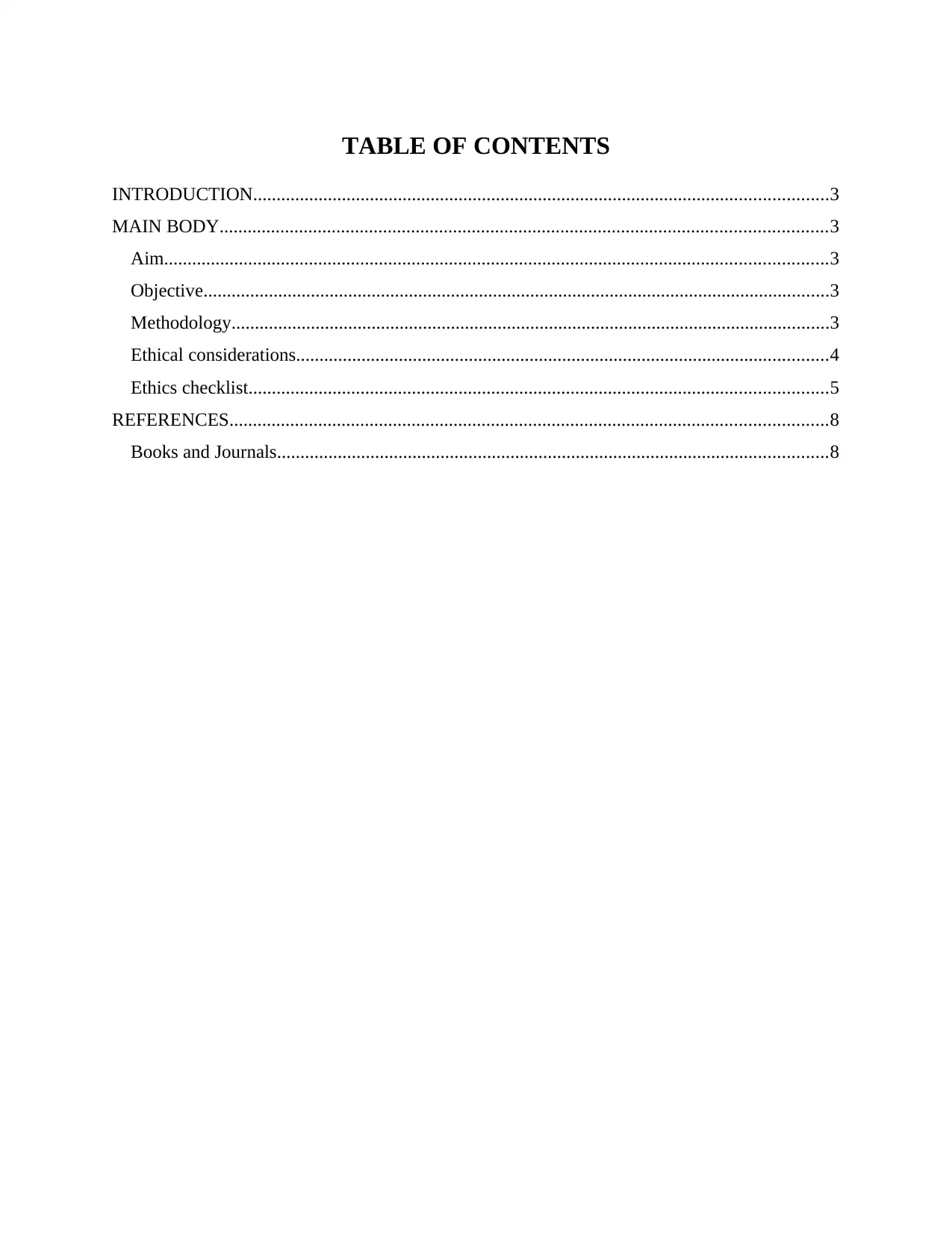
TABLE OF CONTENTS
INTRODUCTION...........................................................................................................................3
MAIN BODY..................................................................................................................................3
Aim..............................................................................................................................................3
Objective......................................................................................................................................3
Methodology................................................................................................................................3
Ethical considerations..................................................................................................................4
Ethics checklist............................................................................................................................5
REFERENCES................................................................................................................................8
Books and Journals......................................................................................................................8
INTRODUCTION...........................................................................................................................3
MAIN BODY..................................................................................................................................3
Aim..............................................................................................................................................3
Objective......................................................................................................................................3
Methodology................................................................................................................................3
Ethical considerations..................................................................................................................4
Ethics checklist............................................................................................................................5
REFERENCES................................................................................................................................8
Books and Journals......................................................................................................................8
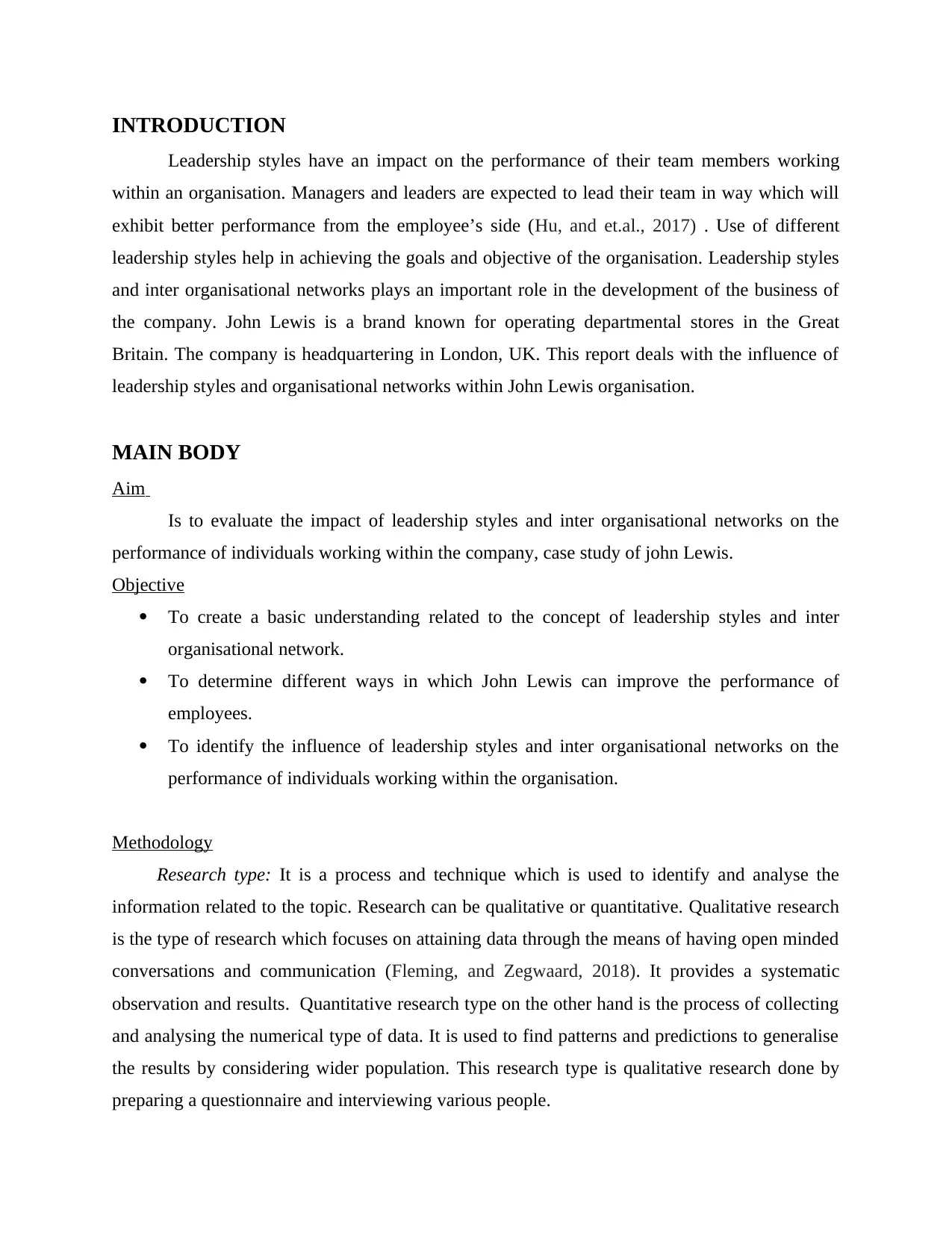
INTRODUCTION
Leadership styles have an impact on the performance of their team members working
within an organisation. Managers and leaders are expected to lead their team in way which will
exhibit better performance from the employee’s side (Hu, and et.al., 2017) . Use of different
leadership styles help in achieving the goals and objective of the organisation. Leadership styles
and inter organisational networks plays an important role in the development of the business of
the company. John Lewis is a brand known for operating departmental stores in the Great
Britain. The company is headquartering in London, UK. This report deals with the influence of
leadership styles and organisational networks within John Lewis organisation.
MAIN BODY
Aim
Is to evaluate the impact of leadership styles and inter organisational networks on the
performance of individuals working within the company, case study of john Lewis.
Objective
To create a basic understanding related to the concept of leadership styles and inter
organisational network.
To determine different ways in which John Lewis can improve the performance of
employees.
To identify the influence of leadership styles and inter organisational networks on the
performance of individuals working within the organisation.
Methodology
Research type: It is a process and technique which is used to identify and analyse the
information related to the topic. Research can be qualitative or quantitative. Qualitative research
is the type of research which focuses on attaining data through the means of having open minded
conversations and communication (Fleming, and Zegwaard, 2018). It provides a systematic
observation and results. Quantitative research type on the other hand is the process of collecting
and analysing the numerical type of data. It is used to find patterns and predictions to generalise
the results by considering wider population. This research type is qualitative research done by
preparing a questionnaire and interviewing various people.
Leadership styles have an impact on the performance of their team members working
within an organisation. Managers and leaders are expected to lead their team in way which will
exhibit better performance from the employee’s side (Hu, and et.al., 2017) . Use of different
leadership styles help in achieving the goals and objective of the organisation. Leadership styles
and inter organisational networks plays an important role in the development of the business of
the company. John Lewis is a brand known for operating departmental stores in the Great
Britain. The company is headquartering in London, UK. This report deals with the influence of
leadership styles and organisational networks within John Lewis organisation.
MAIN BODY
Aim
Is to evaluate the impact of leadership styles and inter organisational networks on the
performance of individuals working within the company, case study of john Lewis.
Objective
To create a basic understanding related to the concept of leadership styles and inter
organisational network.
To determine different ways in which John Lewis can improve the performance of
employees.
To identify the influence of leadership styles and inter organisational networks on the
performance of individuals working within the organisation.
Methodology
Research type: It is a process and technique which is used to identify and analyse the
information related to the topic. Research can be qualitative or quantitative. Qualitative research
is the type of research which focuses on attaining data through the means of having open minded
conversations and communication (Fleming, and Zegwaard, 2018). It provides a systematic
observation and results. Quantitative research type on the other hand is the process of collecting
and analysing the numerical type of data. It is used to find patterns and predictions to generalise
the results by considering wider population. This research type is qualitative research done by
preparing a questionnaire and interviewing various people.
⊘ This is a preview!⊘
Do you want full access?
Subscribe today to unlock all pages.

Trusted by 1+ million students worldwide
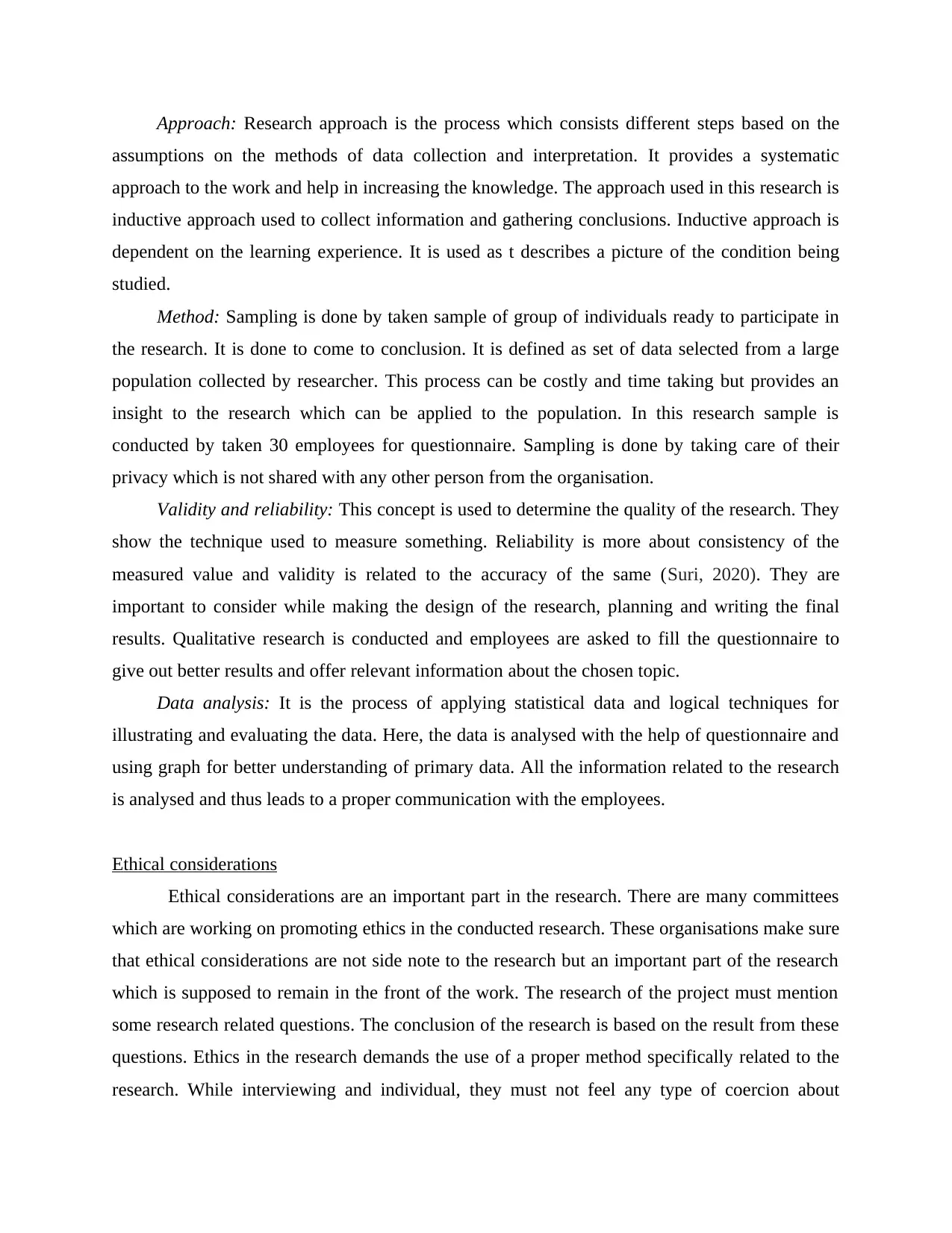
Approach: Research approach is the process which consists different steps based on the
assumptions on the methods of data collection and interpretation. It provides a systematic
approach to the work and help in increasing the knowledge. The approach used in this research is
inductive approach used to collect information and gathering conclusions. Inductive approach is
dependent on the learning experience. It is used as t describes a picture of the condition being
studied.
Method: Sampling is done by taken sample of group of individuals ready to participate in
the research. It is done to come to conclusion. It is defined as set of data selected from a large
population collected by researcher. This process can be costly and time taking but provides an
insight to the research which can be applied to the population. In this research sample is
conducted by taken 30 employees for questionnaire. Sampling is done by taking care of their
privacy which is not shared with any other person from the organisation.
Validity and reliability: This concept is used to determine the quality of the research. They
show the technique used to measure something. Reliability is more about consistency of the
measured value and validity is related to the accuracy of the same (Suri, 2020). They are
important to consider while making the design of the research, planning and writing the final
results. Qualitative research is conducted and employees are asked to fill the questionnaire to
give out better results and offer relevant information about the chosen topic.
Data analysis: It is the process of applying statistical data and logical techniques for
illustrating and evaluating the data. Here, the data is analysed with the help of questionnaire and
using graph for better understanding of primary data. All the information related to the research
is analysed and thus leads to a proper communication with the employees.
Ethical considerations
Ethical considerations are an important part in the research. There are many committees
which are working on promoting ethics in the conducted research. These organisations make sure
that ethical considerations are not side note to the research but an important part of the research
which is supposed to remain in the front of the work. The research of the project must mention
some research related questions. The conclusion of the research is based on the result from these
questions. Ethics in the research demands the use of a proper method specifically related to the
research. While interviewing and individual, they must not feel any type of coercion about
assumptions on the methods of data collection and interpretation. It provides a systematic
approach to the work and help in increasing the knowledge. The approach used in this research is
inductive approach used to collect information and gathering conclusions. Inductive approach is
dependent on the learning experience. It is used as t describes a picture of the condition being
studied.
Method: Sampling is done by taken sample of group of individuals ready to participate in
the research. It is done to come to conclusion. It is defined as set of data selected from a large
population collected by researcher. This process can be costly and time taking but provides an
insight to the research which can be applied to the population. In this research sample is
conducted by taken 30 employees for questionnaire. Sampling is done by taking care of their
privacy which is not shared with any other person from the organisation.
Validity and reliability: This concept is used to determine the quality of the research. They
show the technique used to measure something. Reliability is more about consistency of the
measured value and validity is related to the accuracy of the same (Suri, 2020). They are
important to consider while making the design of the research, planning and writing the final
results. Qualitative research is conducted and employees are asked to fill the questionnaire to
give out better results and offer relevant information about the chosen topic.
Data analysis: It is the process of applying statistical data and logical techniques for
illustrating and evaluating the data. Here, the data is analysed with the help of questionnaire and
using graph for better understanding of primary data. All the information related to the research
is analysed and thus leads to a proper communication with the employees.
Ethical considerations
Ethical considerations are an important part in the research. There are many committees
which are working on promoting ethics in the conducted research. These organisations make sure
that ethical considerations are not side note to the research but an important part of the research
which is supposed to remain in the front of the work. The research of the project must mention
some research related questions. The conclusion of the research is based on the result from these
questions. Ethics in the research demands the use of a proper method specifically related to the
research. While interviewing and individual, they must not feel any type of coercion about
Paraphrase This Document
Need a fresh take? Get an instant paraphrase of this document with our AI Paraphraser
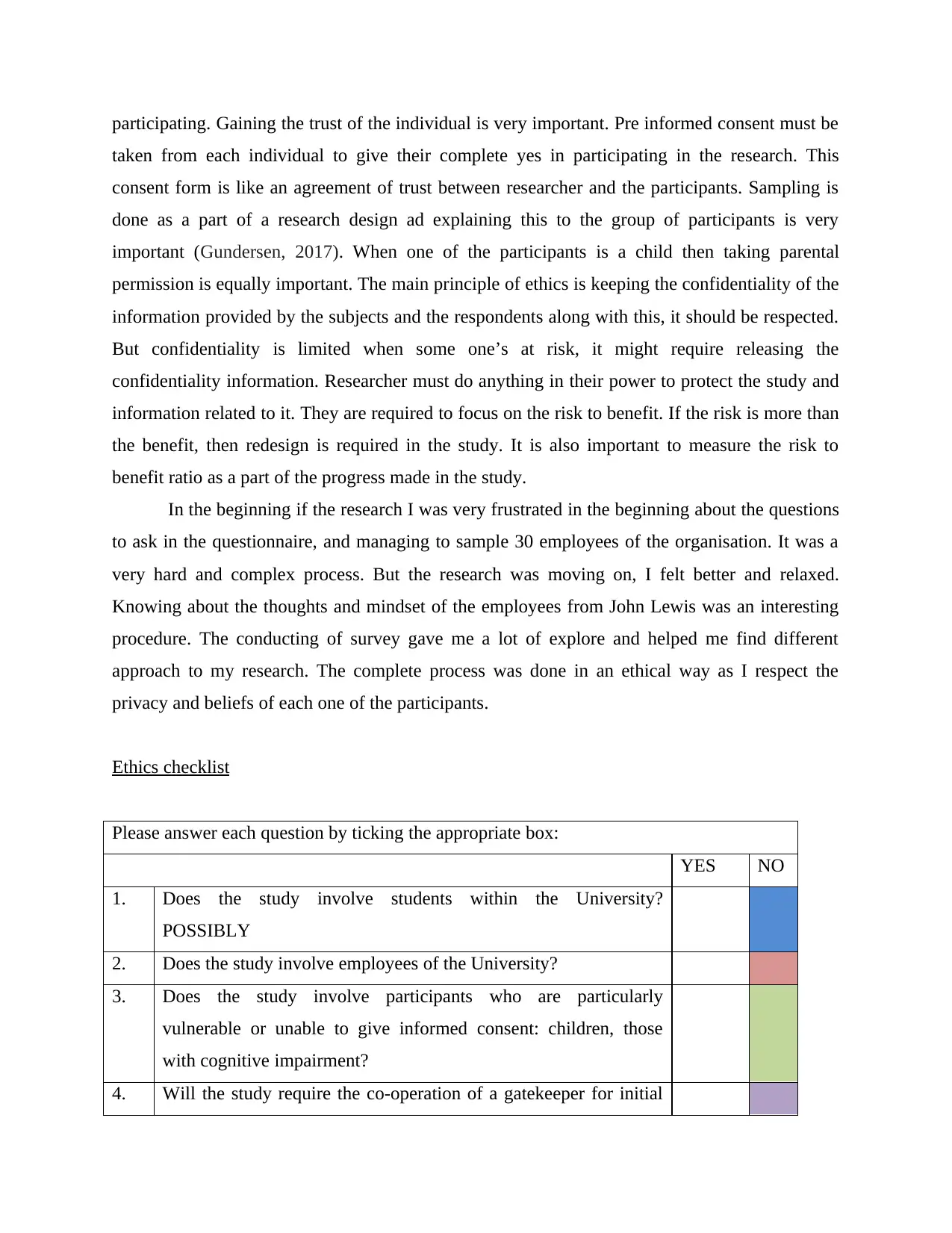
participating. Gaining the trust of the individual is very important. Pre informed consent must be
taken from each individual to give their complete yes in participating in the research. This
consent form is like an agreement of trust between researcher and the participants. Sampling is
done as a part of a research design ad explaining this to the group of participants is very
important (Gundersen, 2017). When one of the participants is a child then taking parental
permission is equally important. The main principle of ethics is keeping the confidentiality of the
information provided by the subjects and the respondents along with this, it should be respected.
But confidentiality is limited when some one’s at risk, it might require releasing the
confidentiality information. Researcher must do anything in their power to protect the study and
information related to it. They are required to focus on the risk to benefit. If the risk is more than
the benefit, then redesign is required in the study. It is also important to measure the risk to
benefit ratio as a part of the progress made in the study.
In the beginning if the research I was very frustrated in the beginning about the questions
to ask in the questionnaire, and managing to sample 30 employees of the organisation. It was a
very hard and complex process. But the research was moving on, I felt better and relaxed.
Knowing about the thoughts and mindset of the employees from John Lewis was an interesting
procedure. The conducting of survey gave me a lot of explore and helped me find different
approach to my research. The complete process was done in an ethical way as I respect the
privacy and beliefs of each one of the participants.
Ethics checklist
Please answer each question by ticking the appropriate box:
YES NO
1. Does the study involve students within the University?
POSSIBLY
2. Does the study involve employees of the University?
3. Does the study involve participants who are particularly
vulnerable or unable to give informed consent: children, those
with cognitive impairment?
4. Will the study require the co-operation of a gatekeeper for initial
taken from each individual to give their complete yes in participating in the research. This
consent form is like an agreement of trust between researcher and the participants. Sampling is
done as a part of a research design ad explaining this to the group of participants is very
important (Gundersen, 2017). When one of the participants is a child then taking parental
permission is equally important. The main principle of ethics is keeping the confidentiality of the
information provided by the subjects and the respondents along with this, it should be respected.
But confidentiality is limited when some one’s at risk, it might require releasing the
confidentiality information. Researcher must do anything in their power to protect the study and
information related to it. They are required to focus on the risk to benefit. If the risk is more than
the benefit, then redesign is required in the study. It is also important to measure the risk to
benefit ratio as a part of the progress made in the study.
In the beginning if the research I was very frustrated in the beginning about the questions
to ask in the questionnaire, and managing to sample 30 employees of the organisation. It was a
very hard and complex process. But the research was moving on, I felt better and relaxed.
Knowing about the thoughts and mindset of the employees from John Lewis was an interesting
procedure. The conducting of survey gave me a lot of explore and helped me find different
approach to my research. The complete process was done in an ethical way as I respect the
privacy and beliefs of each one of the participants.
Ethics checklist
Please answer each question by ticking the appropriate box:
YES NO
1. Does the study involve students within the University?
POSSIBLY
2. Does the study involve employees of the University?
3. Does the study involve participants who are particularly
vulnerable or unable to give informed consent: children, those
with cognitive impairment?
4. Will the study require the co-operation of a gatekeeper for initial
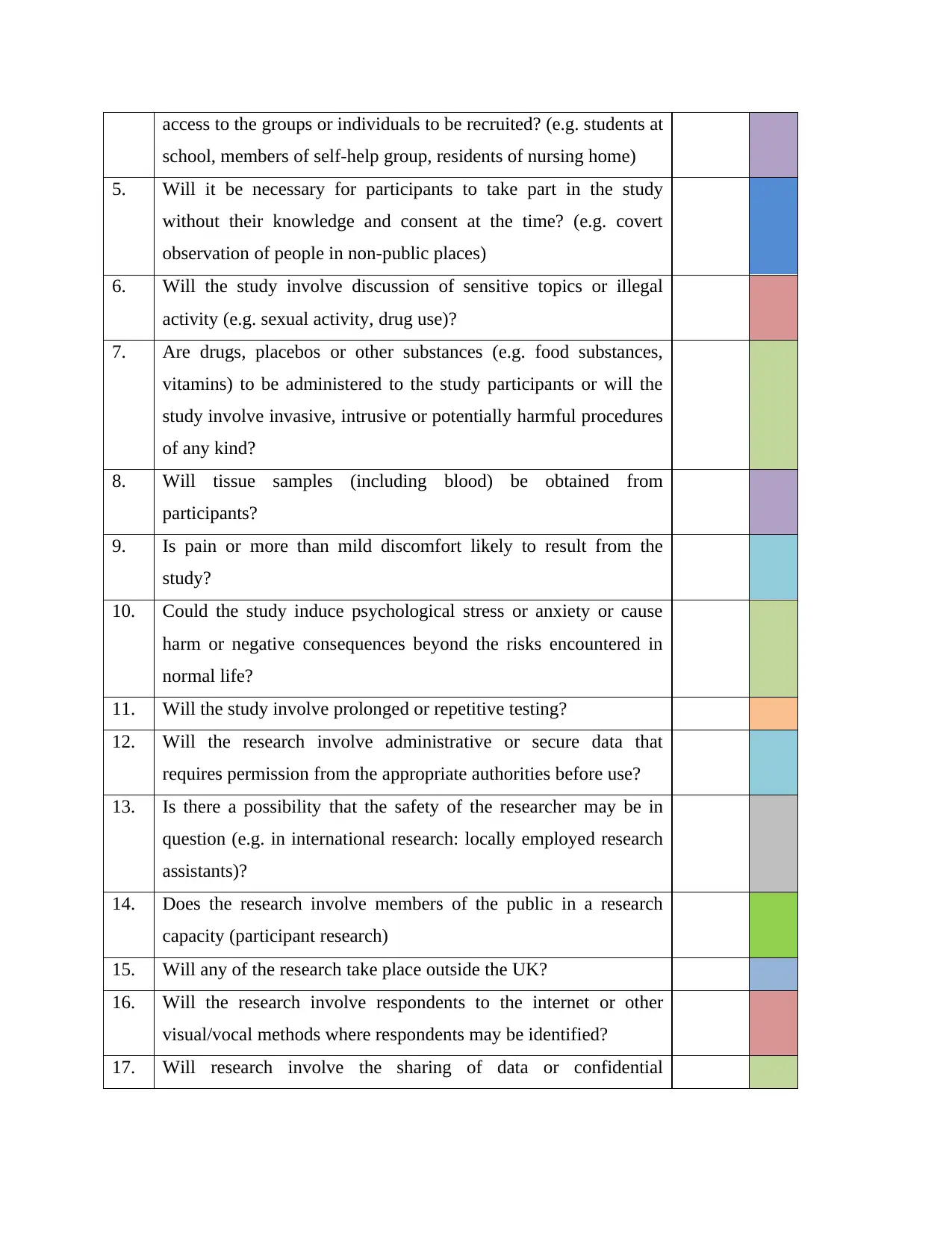
access to the groups or individuals to be recruited? (e.g. students at
school, members of self-help group, residents of nursing home)
5. Will it be necessary for participants to take part in the study
without their knowledge and consent at the time? (e.g. covert
observation of people in non-public places)
6. Will the study involve discussion of sensitive topics or illegal
activity (e.g. sexual activity, drug use)?
7. Are drugs, placebos or other substances (e.g. food substances,
vitamins) to be administered to the study participants or will the
study involve invasive, intrusive or potentially harmful procedures
of any kind?
8. Will tissue samples (including blood) be obtained from
participants?
9. Is pain or more than mild discomfort likely to result from the
study?
10. Could the study induce psychological stress or anxiety or cause
harm or negative consequences beyond the risks encountered in
normal life?
11. Will the study involve prolonged or repetitive testing?
12. Will the research involve administrative or secure data that
requires permission from the appropriate authorities before use?
13. Is there a possibility that the safety of the researcher may be in
question (e.g. in international research: locally employed research
assistants)?
14. Does the research involve members of the public in a research
capacity (participant research)
15. Will any of the research take place outside the UK?
16. Will the research involve respondents to the internet or other
visual/vocal methods where respondents may be identified?
17. Will research involve the sharing of data or confidential
school, members of self-help group, residents of nursing home)
5. Will it be necessary for participants to take part in the study
without their knowledge and consent at the time? (e.g. covert
observation of people in non-public places)
6. Will the study involve discussion of sensitive topics or illegal
activity (e.g. sexual activity, drug use)?
7. Are drugs, placebos or other substances (e.g. food substances,
vitamins) to be administered to the study participants or will the
study involve invasive, intrusive or potentially harmful procedures
of any kind?
8. Will tissue samples (including blood) be obtained from
participants?
9. Is pain or more than mild discomfort likely to result from the
study?
10. Could the study induce psychological stress or anxiety or cause
harm or negative consequences beyond the risks encountered in
normal life?
11. Will the study involve prolonged or repetitive testing?
12. Will the research involve administrative or secure data that
requires permission from the appropriate authorities before use?
13. Is there a possibility that the safety of the researcher may be in
question (e.g. in international research: locally employed research
assistants)?
14. Does the research involve members of the public in a research
capacity (participant research)
15. Will any of the research take place outside the UK?
16. Will the research involve respondents to the internet or other
visual/vocal methods where respondents may be identified?
17. Will research involve the sharing of data or confidential
⊘ This is a preview!⊘
Do you want full access?
Subscribe today to unlock all pages.

Trusted by 1+ million students worldwide
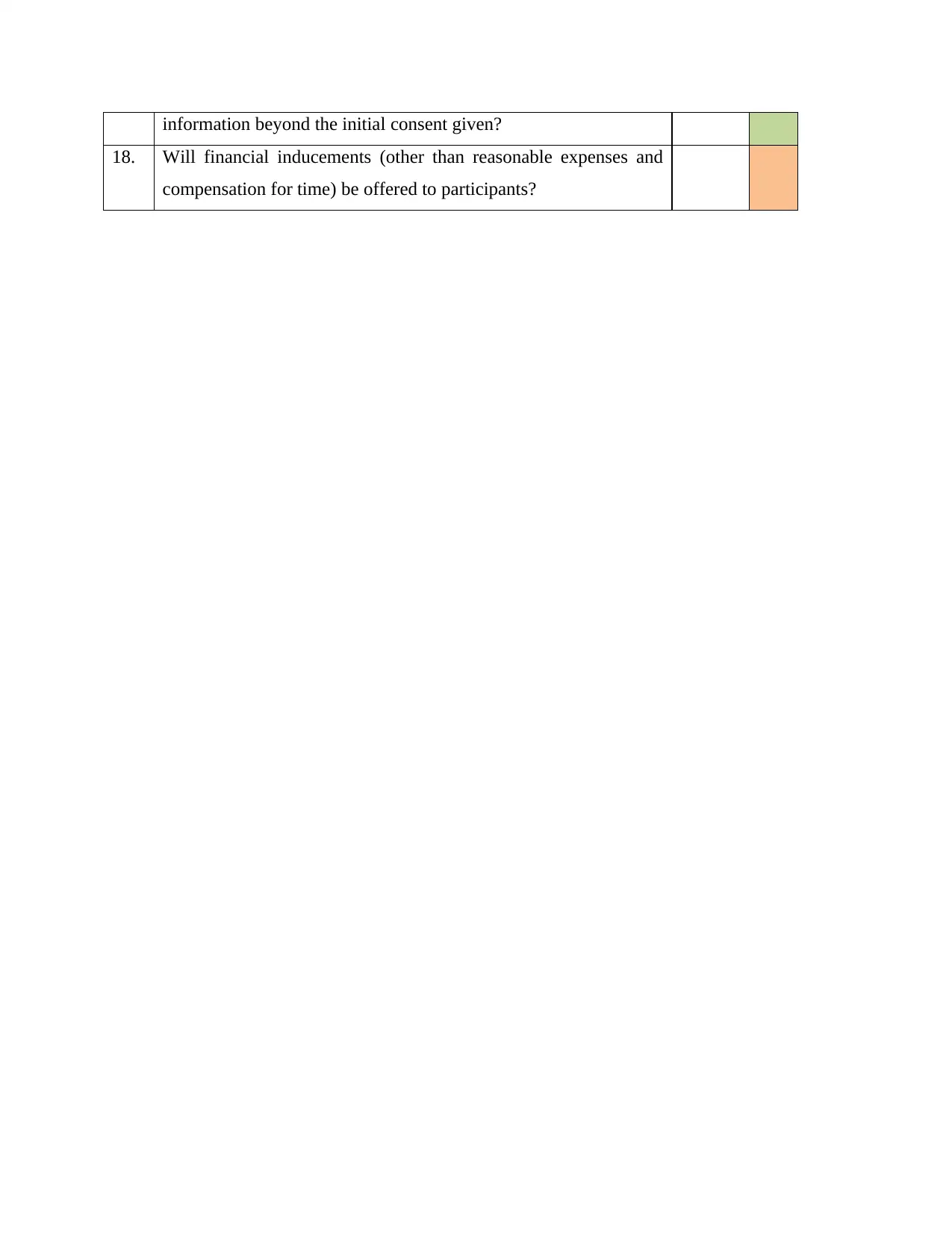
information beyond the initial consent given?
18. Will financial inducements (other than reasonable expenses and
compensation for time) be offered to participants?
18. Will financial inducements (other than reasonable expenses and
compensation for time) be offered to participants?
Paraphrase This Document
Need a fresh take? Get an instant paraphrase of this document with our AI Paraphraser
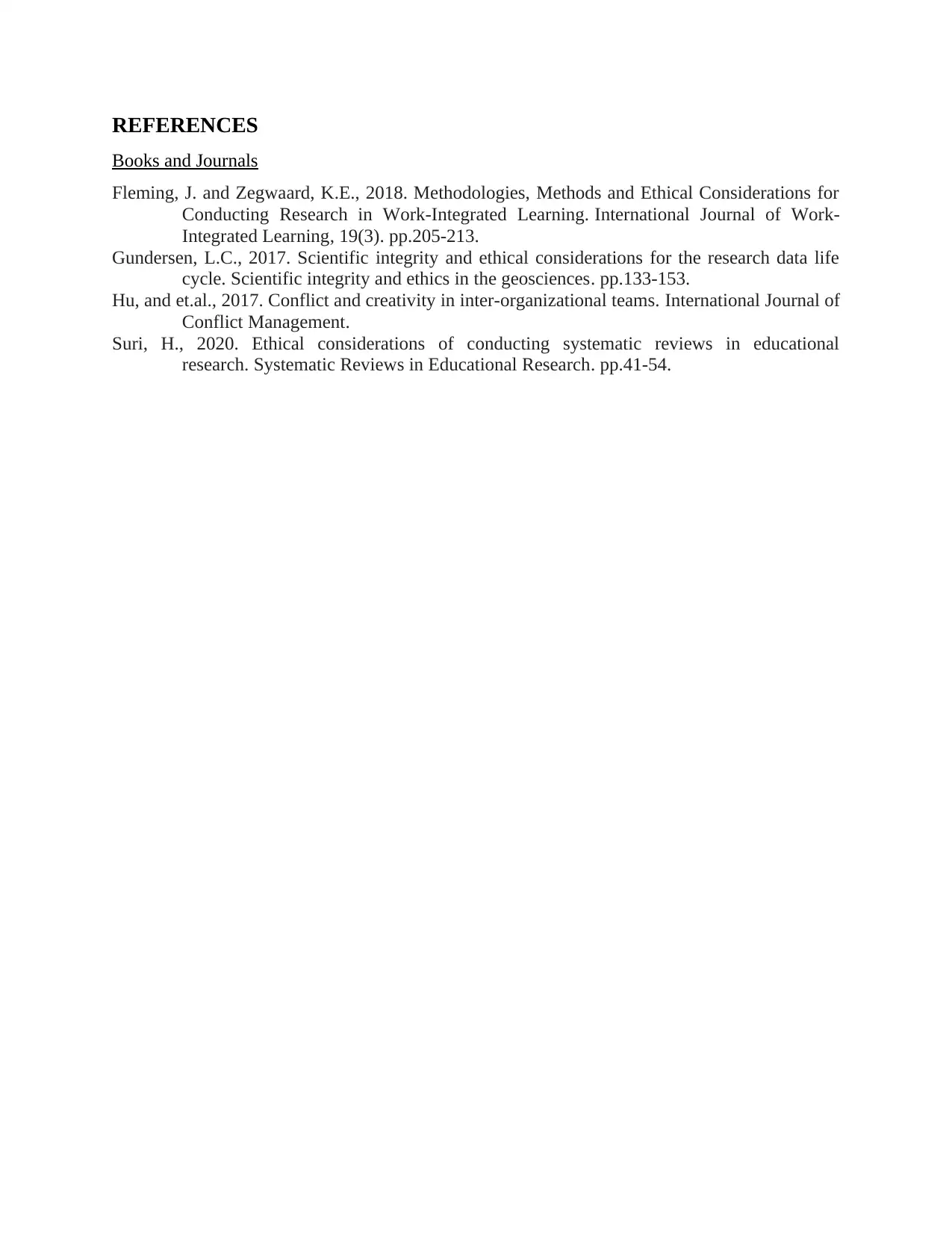
REFERENCES
Books and Journals
Fleming, J. and Zegwaard, K.E., 2018. Methodologies, Methods and Ethical Considerations for
Conducting Research in Work-Integrated Learning. International Journal of Work-
Integrated Learning, 19(3). pp.205-213.
Gundersen, L.C., 2017. Scientific integrity and ethical considerations for the research data life
cycle. Scientific integrity and ethics in the geosciences. pp.133-153.
Hu, and et.al., 2017. Conflict and creativity in inter-organizational teams. International Journal of
Conflict Management.
Suri, H., 2020. Ethical considerations of conducting systematic reviews in educational
research. Systematic Reviews in Educational Research. pp.41-54.
Books and Journals
Fleming, J. and Zegwaard, K.E., 2018. Methodologies, Methods and Ethical Considerations for
Conducting Research in Work-Integrated Learning. International Journal of Work-
Integrated Learning, 19(3). pp.205-213.
Gundersen, L.C., 2017. Scientific integrity and ethical considerations for the research data life
cycle. Scientific integrity and ethics in the geosciences. pp.133-153.
Hu, and et.al., 2017. Conflict and creativity in inter-organizational teams. International Journal of
Conflict Management.
Suri, H., 2020. Ethical considerations of conducting systematic reviews in educational
research. Systematic Reviews in Educational Research. pp.41-54.
1 out of 8
Related Documents
Your All-in-One AI-Powered Toolkit for Academic Success.
+13062052269
info@desklib.com
Available 24*7 on WhatsApp / Email
![[object Object]](/_next/static/media/star-bottom.7253800d.svg)
Unlock your academic potential
Copyright © 2020–2026 A2Z Services. All Rights Reserved. Developed and managed by ZUCOL.





